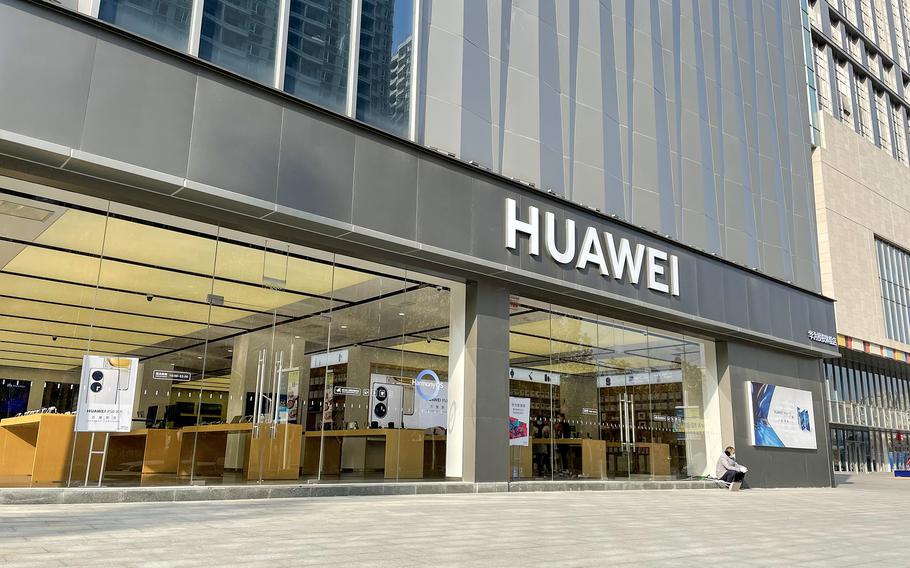
A Huawei store in China on Dec. 13, 2021. The Commerce Department has further restricted the sale of U.S. technology to China’s leading high-tech firm, Huawei Technologies, revoking certain allowances of U.S. chip sales amid renewed fear that Huawei’s gear may be more susceptible to infiltration by Chinese intelligence agencies. (Wikimedia Commons)
The Commerce Department has further restricted the sale of U.S. technology to China’s leading high-tech firm, Huawei Technologies, revoking certain allowances of U.S. chip sales amid renewed scrutiny of the company in Washington.
“We are not commenting on any specific licenses, but we can confirm that we have revoked certain licenses for exports to Huawei,” the Commerce Department said in a statement Tuesday.
The move will curb U.S. companies Intel and Qualcomm from selling chips - the brains of computing devices - to Huawei for its smartphones and laptops, according to three people familiar with the matter who spoke on the condition of anonymity to discuss nonpublic policy details.
The new export restrictions, first reported Tuesday by the Financial Times, come as Huawei faces renewed pressure at other federal agencies like the Federal Communications Commission and an expansive push by the Biden administration to build up new American companies that can compete against Huawei.
Meghan Harris, senior vice president of Beacon Global Strategies, said recent announcements about new Huawei products using U.S. technology were probably the “straw that broke the camel’s back” to prompt the new curbs.
Huawei has loomed large in the U.S.-China rivalry as China’s most technologically proficient company and a supplier of internet and phone networks in virtually every country, including in rural parts of the United States. These networks are geopolitically sensitive due to the interest that intelligence agencies have in the data they carry.
U.S. officials fear Huawei’s gear may be more susceptible to infiltration by Chinese intelligence agencies than Western vendors’ products. Huawei has adamantly denied that it helps the Chinese government spy.
Despite years of U.S. efforts to stymie its advance, Huawei was still the world’s No. 1 company in 2023 in the number of patent applications filed. It is also still the world’s top seller of the pipes that make up internet and phone networks, and remains a major player in consumer gadgets like smartphones.
Separately on Tuesday, the National Telecommunications and Information Administration (NTIA) announced $420 million in grants for companies from the United States and ally nations to build phone network gear that can compete against Huawei’s.
The NTIA included a requirement for grant recipients to pair up with a network operator to help ensure their products can secure a major buyer when they go to market. And the FCC plans to vote this month on a proposal that would bar Huawei from certifying wireless equipment for the U.S. market.
Washington’s export controls against Huawei began under the Trump administration, which imposed broad sanctions that forced the company to divest parts of its business to survive and turn to domestically produced chips for advanced functions. However, U.S. companies were allowed to continue selling to Huawei some products deemed less sensitive.
These allowances have drawn criticism from China hawks in Washington, who have called them loopholes in the sanctions. Last week, Sen. Marco Rubio (R-Fla.) and Rep. Elise Stefanik (R-N.Y.) wrote a letter to Commerce Secretary Gina Raimondo urging the department’s Bureau of Industry and Security to stop Intel and Qualcomm from selling chips for Huawei’s smartphone and personal-computer businesses.
In a statement, Rubio praised Tuesday’s new restrictions as “the right decision” but added that “the license never should have been granted in the first place.”
Intel declined to comment. Qualcomm did not immediately respond to a request for comment.
Huawei came into Washington’s crosshairs in the early 2000s due to its construction of phone networks made of fiber-optic cables that it sold to countries like Iraq and North Korea - which hampered U.S. surveillance via radio communications.
Huawei became a top policy priority in Washington under the Trump administration, as it became apparent that the company was no longer just a low-cost contender and had reached the cutting edge of R&D in its industry.